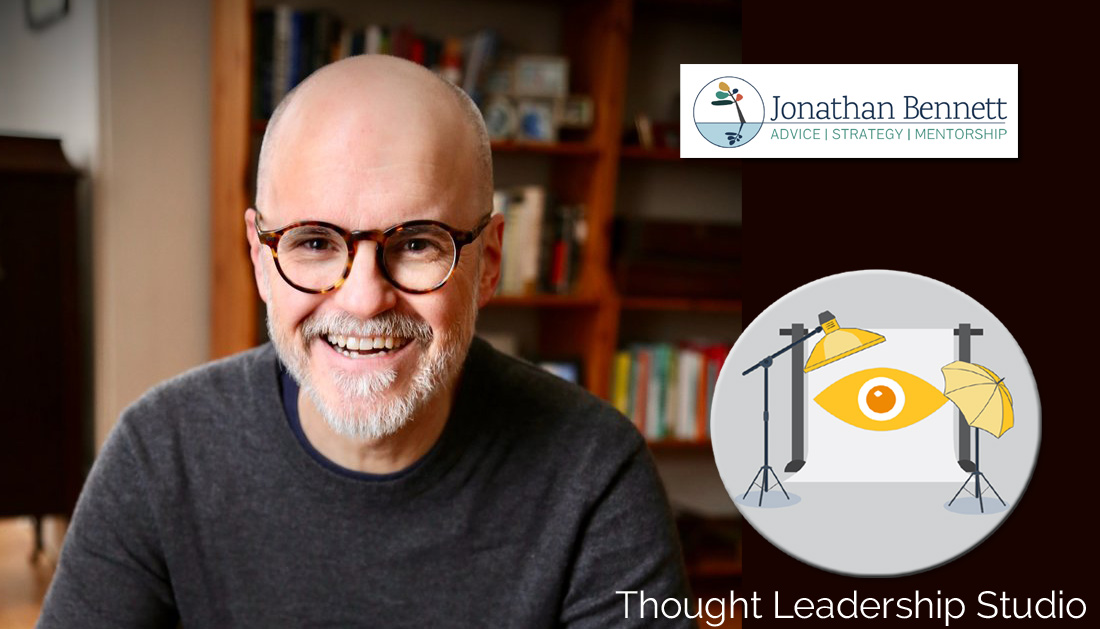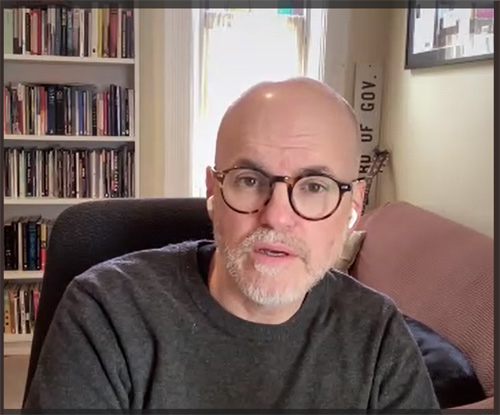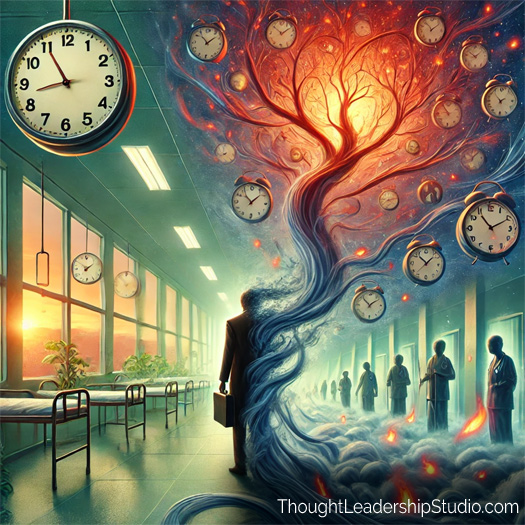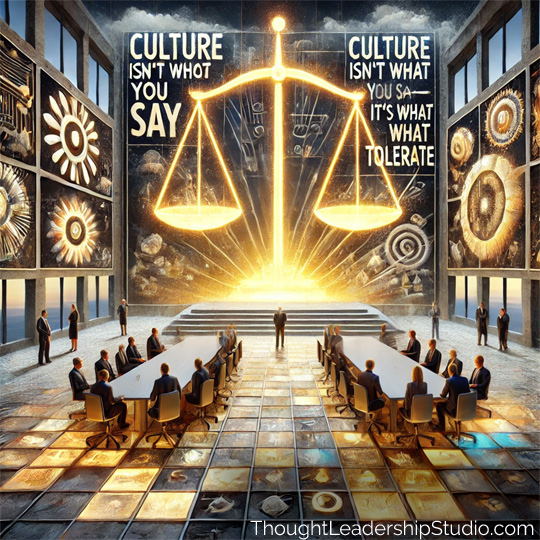Thought Leadership Studio Podcast Episodes:
Leading with Integrity and Imagination with Jonathan Bennett
Episode 96 – Leading Through Change: Ethical Insight for the Thoughtful Profession, Founder, or Entrepreneur

#coaching, #consulting, #ethics, #imagination, #influence, #inspiration, #interview, #leadership, #management, #mentaltraining, #nonprofits, #paradigmchange, #storytelling, #strategicthoughtleadership, #systemsthinking, #thoughtleadership
Or Click here to listen or subscribe on appWhat this episode will do for you
:- Meet a Purpose-Driven Leadership Guide: Get introduced to Jonathan Bennett, executive coach, strategic advisor, and founder of Laridae, a B Corp-certified consulting firm dedicated to meaningful, values-aligned change.
- Clarify the Roles of Coach, Consultant, and Advisor: Understand the distinctions and overlaps between coaching, consulting, and advising—and why meeting clients where they are matters more than labels.
- Learn from Real-World Complexity: Hear how Jonathan’s experiences in high-pressure healthcare environments shaped his approach to leadership, organizational development, and ethical decision-making.
- Explore Values in Action: Discover how Jonathan connects organizational values to actual behaviors, ensuring that stated principles aren’t just slogans on a wall but part of the culture’s DNA.
- Navigate Career Crossroads with Clarity: Gain tools and insights for recognizing when it’s time to make a change, and how to turn uncertainty into a structured plan for growth and transformation.
Jonathan Bennett.
In this episode, I’m joined by Jonathan Bennett, executive coach, strategic advisor, and founder of Laridae consulting firm.
Strategic Thought Leadership is about elevating influence by leading to fresh perspectives with purpose - and Jonathan embodies that ideal.
Jonathan brings over 25 years of experience helping purpose-driven leaders navigate complexity, align values with behavior, and build high-trust, ethical cultures. His background spans healthcare leadership, community-based initiatives, and indigenous reconciliation work, giving him a unique lens on organizational change.
In this interview, we explore the blurred lines between coaching, consulting, and advising—and how Jonathan uses storytelling and imaginative exercises to help clients gain clarity in moments of transition. He also shares insights on the shifting social contract and how younger generations are reshaping the meaning of work and leadership.
Some of Jonathan's coordinates:
Curated Transcript of Interview with Jonathan Bennett
The following partial transcript is lightly edited for clarity - the full interview is on audio. Click here to listen.
Chris McNeil: I'm your host of Thought Leadership Studio, Chris McNeil, and I'm sitting across Zoom with Jonathan Bennett, the executive coach and strategic advisor with a remarkable track record of empowering purpose driven leaders.
As the founder of Laridae, a B-Corp certified consulting firm, Jonathan has dedicated his career to helping organizations and leaders navigate complexity, align their values with their work and foster meaningful change.
With experience spanning urban, rural, remote, and first nations communities, Jonathan brings the unique perspective to leadership and organizational development.
His passion for coaching and his commitment to aligning profit with purpose have made him a trusted advisor to leaders seeking to make a lasting impact. Welcome, Jonathan..
 Jonathan Bennett: It's great to be here. Chris. Thanks for having me.
Jonathan Bennett: It's great to be here. Chris. Thanks for having me.
Chris McNeil: It's great to see you. And to the listener - this is the second interview because I messed up for the first time in 90 odd podcast episodes ... I didn't press the recording button correctly, so I'm looking right now and we are actually recording, so that's great news.
Great to have you back, Jonathan.
Jonathan Bennett: It's great. The first was just a warmup. Now we're ready for the real thing.
Chris McNeil: We are well rehearsed. We are practiced. Absolutely. And maybe a good place to start would be going back to the conversation about the difference between a coach and an advisor and a consultant. What do you have to say on that topic?
Navigating the Gray Areas Between Coach, Consultant, and Advisor
What makes someone a coach, a consultant or an advisor, and where's the wiggle room in those terms?
Jonathan Bennett: Yeah, I think the easy thing to say is there's a lot of overlap. The internet though, is pretty focused, focused on the internet, are pretty focused on carving out some boundaries around each of these different professions, and I think there's some merit to it and some thought and purpose that goes into it. And it's also in some cases kind of arbitrary and a bit of gatekeeping.
So I think it's important to kind of navigate these things with a bit of an open mind. There are aspects to especially the coaching world, which has really matured over the course of the last 10 years, especially lots of certification programs, lots of real focused training that goes on in order to become a coach, but it's not a regulated profession, unlike maybe psychotherapy let's say, with social work, which have really quite different accountabilities and quite different focuses to say nothing of a lot of clinical research that underpins the work there.
 So I think that coaching is probably growing up and I think it's really, really relevant. I'll just speak totally personally lest I offend coaches out there. I use coaching as a tool. I sit in the pocket of conversations. I say deeply curious and I think that my clients like it a lot. I've also found it somewhat limiting, which is to say I bring 25 years of experience and I've chaired lots of boards and I've been a CEO and I've founded a company and grown it and sold it. I have things to contribute and I can do some of that through questioning.
So I think that coaching is probably growing up and I think it's really, really relevant. I'll just speak totally personally lest I offend coaches out there. I use coaching as a tool. I sit in the pocket of conversations. I say deeply curious and I think that my clients like it a lot. I've also found it somewhat limiting, which is to say I bring 25 years of experience and I've chaired lots of boards and I've been a CEO and I've founded a company and grown it and sold it. I have things to contribute and I can do some of that through questioning.
But I also work with people that are busy and they don't want to go on a self-discovery journey. They need consulting work and they need mentorship or they need advice. And so I'm somebody who just looks to meet my client where they're at. I will often approach with a deeply curious stance and sit in the pocket and ask them lots of questions, but if I sense that it's not there within them either because they haven't got enough time or they just genuinely have never come across this before, then I'll move into advice giving mode or trusted support mode. Sometimes shaping out a consulting project to support them and walk alongside them with thought partnership. It really just needs to be fluid and meet my clients where they're at.
Chris McNeil: That makes perfect sense. And how many times do we run into situations as coaches or consultants where the perceived role might limit our effectiveness if we're not careful?
Jonathan Bennett: That for me is the core question, Chris. I think that I am unwilling to be limited and I feel like I am skilled enough at this point in my career. If you're listening, I have a gray beard and a bald head, and so I feel like I called to serve and to serve whoever's in front of me with the best of my abilities.
And as long as I have the full access and I'm sitting in a pretty regulated spot, I feel like I'm a decent judge of the kind of support that the person needs. And I like to not be in a box. And so I don't typically call myself a coach. Other people do call me a coach, but I don't really call myself a coach. And I mostly sort of say if I need a kind of descriptor, I'll say I'm a trusted advisor or professional mentor because that's mostly what I do.
From Burnout to Breakthrough as a Path to Purpose-Driven Leadership
Chris McNeil: Sure, it makes sense. And maybe to back up a little bit, broaden the perspective and bring the listener closer to understanding where you're coming from if not already familiar with their work.
Was there a pivotal moment or a shift in thinking or an event that set you on a path to doing what you're doing today that you could share with the listeners a story to give them some background on why you do what you do and where you're coming from?
Jonathan Bennett: In a way, I've always done this work. It's just looked different along my pathway. I for some reason started off my career being essentially an executive assistant. I took minutes and I served CEOs and executive directors and supported them in all the things. And from there I moved into communications roles and increasingly more complex communications roles, which sort of capped out when I was the chief communications officer of a large regional hospital here in Ontario, Canada where I live. I served on the senior team, lots of exposures to boards. I've been on boards of directors for more than 20 years and I'm a charter director.
And these early experiences for me allowed me long before I had anything much to contribute, but to be in proximity of a lot of decision making and a lot of power and authority. And I think I just absorbed it, the good and the bad, and I've spent a lifetime sorting out the good from the bad and what I want to pass on and which nuggets are still worth it and which ones were never good and some have aged out, which I think is kind of an interesting topic.
 So I suppose, I don't know if it was one particular point, I could certainly point to a few key transformational moments in my career. I landed a role at this big hospital and I felt like I was just a fish out of water. I'd never worked in acute care before. And here was this 24 7 institution with 3000 employees and four trade unions and very complex set of circumstances. We were building a new hospital and we were the subject of much media inquiry because of this huge capital project and a massive fundraising campaign. And I don't want to get into healthcare in Canada, and that'll just trigger a whole bunch of people if you've got American listeners.
So I suppose, I don't know if it was one particular point, I could certainly point to a few key transformational moments in my career. I landed a role at this big hospital and I felt like I was just a fish out of water. I'd never worked in acute care before. And here was this 24 7 institution with 3000 employees and four trade unions and very complex set of circumstances. We were building a new hospital and we were the subject of much media inquiry because of this huge capital project and a massive fundraising campaign. And I don't want to get into healthcare in Canada, and that'll just trigger a whole bunch of people if you've got American listeners.
But I am grateful. It was kind of like three free MBAs. I just would go into the office into the hospital at six in the morning before rounds to meet with physicians and sometimes I wouldn't leave until 11 at night after I'd shepherded last of the audit and finance committee members out the door. And it was a very unsustainable job. They're particularly unhealthy places to work, and it's a shame, of course, they ought to be among the most sophisticated and the most focused on care, but they tend to run themselves just like everybody was the emergency department and that everything was urgent and everybody's on fire. And it really, of course shouldn't be like that and the best hospitals are not.
But I think it's more than common for the environments in acute care to be like that. And so I learned just an awful lot about leadership about, I had an outsized amount of influence, but not a direct line and a pinnel. I just didn't have a lot of employees, but I was in charge of lots of things at various times. I had patient relations and I had risk management for a while, government relations, marketing, branding. It was a big portfolio that kind of ebbed and flowed as the needs of the organization ebbed and flowed. And when I finally chose to leave, it had been about, I think six and a half years. I was so done, I was absolutely exhausted. But I think ultimately very grateful for the exposure to that extremely frenetic, complicated world.
Chris McNeil: How does that advise how you look at organizations now?
Jonathan Bennett: I think about my time there and my proximity to complexity a lot because just about everything I deal with is not that hard, not as hard as that world. I don't want to say never because I deal with some clients that have some pretty awesome problems for sure. But in terms of just moving parts and a workforce that is highly regulated, highly complex with lots of moving parts and everybody's looking at it, I learned an awful lot.
And I think if anybody's listening to this and they're in healthcare, they'll understand it. It does risk itself getting a bit high on itself. Healthcare thinks it's just the beginning and an end of it, all of it. And there is life after healthcare and there's a lot more. For me, there's been far more work that's been meaningful that has happened in a slower, more considered, iterative, thoughtful way.
And I'm really drawn to that kind of work now. I don't enjoy fast paced, high stress environments the way I did when I was young, largely because I think the results aren't sustainable and they're just addicted to change in healthcare. And I'm doing community-based work that is very inclusive and very evolutionary, and I think that the results that I'm seeing and the kind of transformations that I'm seeing is far more impressive and I get a lot more personal satisfaction out of it.
Where Governance Meets Humanity: Reimagining Leadership Through Indigenous Wisdom
Chris McNeil: Can you talk more about the community-based work, the kind of work that attracts you? What attracts you about it and how do you find the levers for change in those situations?
Jonathan Bennett: Well, I think often it's a personal journey when you get involved at a community level. So I'm the co-chair of a community health center, so this is a grassroots organization that serves vulnerable people in our community. We employ primary healthcare practitioners like physicians and nurse practitioners and nurses and dieticians. But the organization has a shared governance model between indigenous and non-indigenous people.
And I was the founding co-chair of this organization. We're still pretty new. And so we're on this shared governance journey to understand how do we steward and take care of an organization that's serving vulnerable people in the community, many of whom are indigenous in a way that is accessible, is culturally relevant and appropriate, is welcoming. And that to me has been very deep personal work because you can't sit around a board table and just look to Robert's rules and managing time. My colleagues that are indigenous have so much wisdom and a completely different way of looking at life.
 And for me it's a kind of interrogation of how I do governance work. I sit on two corporate boards and I've been on boards my whole life and I'm trained and I do board training all the time, but here I am with indigenous folks that don't want to do that. It feels colonial and the decision making isn't how they do decision making in their communities. And so they want the boardroom to reflect their work in a good way.
And for me it's a kind of interrogation of how I do governance work. I sit on two corporate boards and I've been on boards my whole life and I'm trained and I do board training all the time, but here I am with indigenous folks that don't want to do that. It feels colonial and the decision making isn't how they do decision making in their communities. And so they want the boardroom to reflect their work in a good way.
And so I have learned a lot about what that means and it's really re-engineering how I'm approaching governance because I'm using skills and tools that I'm learning at that nonprofit board in my for-profit board, work in how I chair in, how I hold space and in how I conduct meetings is just really changing quite appreciably. So there's a great ripple effect, and I'm learning lots.
Chris McNeil: Interesting collision of views of the world. And so has the empathy of working with that kind of setting shift your worldview in general and the other engagements that you have?
Jonathan Bennett: I've been doing work in and around indigenous reconciliation in Canada for quite a long time, and I have a personal connection to it as well. And so it's important work for me, but it's work that's kind of never done. It's a kind of ongoing investigation of for sure your privilege and the way you show up in spaces, but also to just understand more about an indigenous worldview and that while you're never going to appropriate it or use it in a kind of, I don't know, a way that you're not supposed to allowed to or that's just going to be harmful.
I think there's just great teachings there about different ways of doing work that can get different things done. I'll give you an example if you want. I am on Treaty 20, which is Williams Treaty 20 Williams Treaty here in Ontario. And I am just blessed to be brought into circles with indigenous people who when they start their work and they start a meeting, the loose translation of what they're doing is they're visiting. And you and I wouldn't go into a business meeting and sit there for 45 minutes and say, if I was meeting you, I wouldn't ask you where your grandparents are from. And I wouldn't say, oh, and then what happened? And then how are all your kids? And oh, that sounds hard that your mom's not doing well, and tell me more about that. But that is how they start their meetings.
It's very relational work and it looks like they're wasting time. That's what it looks like is happening. But what I've learned is in fact, the opposite is happening. What they're doing is they're kind of going slow to go fast. They spend a lot of time building trust, deeply seeing the humanity and the person sitting across from them and learning where they're at and what their needs are. And then when the meeting starts, the politics, the passive aggressive remarks, the using power and tools that we have around let's say a board table, that kind of gameplay tends to not go on.
I'm not saying they're perfect, but they've reached such a level of, reached such a level of trust that they don't have to do that to get consensus to find the right way forward. And so it's just a different way of doing things. So how do I do things differently? So now I'm in a corporate board setting and instead of just saying, great, can I have approval for the minutes? Are there any conflicts of interest? Like let's dive in. I'll say, let's go around and do a check-in round. What's going on? How are you showing up today? What's going on in your world? Just take a couple minutes and so I'll take 15 minutes. People are 20 minutes, people are used to it.
Now, I don't take an hour and my colleagues around the CHC kind of do, but I'll take as much time as socially kind of awkwardness will allow me to take, but I'm facilitating it and I'm already noticing good results. I'm already noticing a change in the quality of the conversation. The depth of relationship is improving. And so I think that these are good things.
Chris McNeil: That's a powerful look outside the conventional filters of our western industrial view. And I think it was John Grinder who said The best way to understand your own mind is to visit another culture.
Jonathan Bennett: Yeah.
Chris McNeil: (It helps you to) Start to question some of these norms, some of these belief systems. And I love the going slow to go fast. I can see how that aligns with the values alignment type of work that we've discussed.
How do values guide your work with your clients? How do you understand prevalent values and help organizations get aligned around values consciously?
Culture Isn’t What You Say—It’s What You Tolerate
Jonathan Bennett: Yeah, it's interesting you bring this up. I've been thinking a lot about it. I've done values work helping organizations to articulate their values. I would say from a lens that looks something approximal to branding work, that's kind of how I've approached it historically is through kind of open-ended questions and focus groups and other tools to kind of harvest what feels like an organization set of words and then the definitions that support their words.
And I can usually get them to land on a half dozen words that are really accurately describe what it's like to be here and what our culture will tolerate and where the lines of acceptability here, kind of like what's our ethical model. And I've always felt that that work is good work. And I'm starting to see though that you're always at risk of articulating pretty things on pieces of paper that go on a board room wall and are not really represented well in the culture of the organization. And this is always the risk is that it looks great, but it doesn't actually live in the DNA.
And the thing that I've been thinking about a lot more Chris, is the connection with values and behavior. And so that's when values get tested. So these days when I'm doing work around values from an organization, I'm asking far more for stories around behavioral responses inside the organization. What are we willing to tolerate? What are we willing to look away from? What are we insist on?
 These are the kinds of lines of questions now that tend to get me, I think less six pretty words on the boardroom wall and more an ongoing conversation that really pushes an organization to think about out showing up for one another for itself, for the people in its orbit, suppliers in the nonprofit sector, donors and funders and clients. And in the for-profit sector, it might be whatever supply chain, your clients, your customers, you name it. So I think about these things quite a bit now, and I think I'm changing my mind on how to best work around purpose-driven work. And I'm shifting more and more towards behavior now as a thing to both note, articulate name and then change. If it's not what we like,
These are the kinds of lines of questions now that tend to get me, I think less six pretty words on the boardroom wall and more an ongoing conversation that really pushes an organization to think about out showing up for one another for itself, for the people in its orbit, suppliers in the nonprofit sector, donors and funders and clients. And in the for-profit sector, it might be whatever supply chain, your clients, your customers, you name it. So I think about these things quite a bit now, and I think I'm changing my mind on how to best work around purpose-driven work. And I'm shifting more and more towards behavior now as a thing to both note, articulate name and then change. If it's not what we like,
Chris McNeil: Well, there's the values that we write on the wall and there's those that we live by and people are our greatest asset gets tested when sales are down. And do you lay off people, find another way? How do we deal with the situations where an organization's kind of taken on a life of its own?
It's grown beyond the infancy stage and we have a board to report to who's looking for strong quarterly profits, and yet we want to be purpose driven and value driven. How do we navigate those situations? How do we get more congruence and walk our talk better?
Jonathan Bennett: I think when we say the quiet part out loud, that's when cultures do better. High trust environments are typically environments that have deep accountability. They're safe environments. And when we have leaders that include people in the decision making that have a level of transparency that is outsized for what folks are used to, they'll double down on their commitment to the organization and they'll withstand a poor quarter or worst case scenario or second worst case scenario, a series of layoffs. Because it ultimately is a bigger thing than the organization itself. It's about people's identity and especially young folks, they just want to have your word there is congruent.
They want to be congruent with who they are and they want their place in the work world of work to match. And it is a change. It's not like we didn't care and we meaning I'm the gen xo, it's not like I didn't care about things. I worked in nonprofits and I've worked in healthcare. I mean, I've been pretty mission driven my whole life. I've got a long connection with the arts and all of those things really matter to me.
Entrepreneurship or Escape Plan? Navigating a World Without Guarantees
But I think what's changed is just the economic reality for young people. The promise of a route to middle class safety and security has just been broken. And it's very hard to say to somebody in their twenties, you should work late. You should put it in in your best interest. When they look at you and say, I'm never going to own a house.
I can barely afford my groceries and a living wage is not enough. And that's very difficult. It's really, it's almost like the social contract has been broken. And how I think we see it play out is in the workplace. It's in workplace culture, and they are articulate and they know what's going on. They might not know, haven't been in the world of work a long time.
 So there's lots of things they don't know for sure. And I have a lot of sympathy with my clients, many of whom are CEOs who have workforces, who they're struggling to understand what the motivation is. And my read on it is that the gap between what it's like to be in a position of leadership and what it's like to be entering the journey is bigger than ever. And the promises have changed and the pathways have changed. And that's the disconnect.
So there's lots of things they don't know for sure. And I have a lot of sympathy with my clients, many of whom are CEOs who have workforces, who they're struggling to understand what the motivation is. And my read on it is that the gap between what it's like to be in a position of leadership and what it's like to be entering the journey is bigger than ever. And the promises have changed and the pathways have changed. And that's the disconnect.
I think that people don't see it. People reflect back. When you're at the top, you reflect back on what it was like for you. And those things aren't true anymore. The conditions have changed. A lot's happened in 25 years, and I think it's really, I have a lot of sympathy for young people that are thinking about how to build a career, where to go, how to go about doing it.
And I think we're seeing in some cases, exacerbation in some cases like, screw it, I'll just be an entrepreneur, like a kind of recklessness because there is no security, which great things come of that kind of the ...
Chris McNeil: Guilty as charged.
Jonathan Bennett: Yeah, yeah, me too. Right? Me too. But I think it's something when you're building it on the back of or a career already, well in progress, it's another thing when you're 20 something and you don't even know really who you are or what you like, but you're still willing to take a bet on yourself and start a business and grow something. That to me is just really exciting.
But it's coming from a place not always of entrepreneurship and ultimate risk taking. It's coming from a place of what else can I do? What other choices have I got? And I don't love that part of it, but the outcome part of it, I think that ultimately they'll be mostly great.
When Integrity Clashes with Reality: How to Know When—and How—to Move On
Chris McNeil: One of the things that drove my journey into entrepreneurship starting at age 23, 24 was a big anti-authoritarian bent that came in part from seeing corruption and leadership. And I had a manager who doctored contracts. I quit the job when I found out and moved on, went to his leadership. They kept him on because he was hitting numbers and it was like, "This is not how a business should be run".
But then I've seen examples of principal centered leadership as well that's coming from place of contribution and giving. How do we sort those out? And what would you recommend to the younger listener of this who's maybe at a crossroads of decision in evaluating a path into an organization or following the wrong lead into an industry, how do you know what's right for you?
Jonathan Bennett: That is a great question, and it's a complex one, I think. I mean, first and foremost, your ethical model is something that is for you and for you only to understand. And often it doesn't become clear until something is playing against it. Something in the pity of your stomach just says, this isn't right. When that guy was doctoring a contract, you knew that that was breaking the law, fraudulent and things like that happen in small ways and big ways in the world of work, sadly all the time. And sometimes it's not legal, sometimes it's a kind of relational acts of bad faith, people screwing each other over or people just behaving intolerably bad and yet getting away with it.
I have a client right now that is dealing with a toxic boss, and the human resources around it is just absolutely appalling how poor they're not investigating, not following through, not what I would describe as doing the basics. Well, and this happens all the time to people. And so when those folks are, when I'm working with them, when they're in my practice, I usually sort of like to think about it as, because there's practical overlays here.
 People have a mortgage or they've got rent to pay or the kids at the school, I can't quit, Jonathan, I'd like to just quit, but I can't. And so the metaphor that I like to use as this isn't a fork in the road, but there's a fork in the road that is coming. And so knowing that gives a bit of grace and a bit of air. You're not stuck forever, but you're stuck for now. And what things can we do to help you make a choice when and if the time comes? Because there's only so long, do we agree that the conditions for success are not present? And if the answer is yes, they're never going to change, they're narcissist or they're horrible or they're doing things that I'm not sure are illegal or I'm just bought out of my brains and they treat me badly.
People have a mortgage or they've got rent to pay or the kids at the school, I can't quit, Jonathan, I'd like to just quit, but I can't. And so the metaphor that I like to use as this isn't a fork in the road, but there's a fork in the road that is coming. And so knowing that gives a bit of grace and a bit of air. You're not stuck forever, but you're stuck for now. And what things can we do to help you make a choice when and if the time comes? Because there's only so long, do we agree that the conditions for success are not present? And if the answer is yes, they're never going to change, they're narcissist or they're horrible or they're doing things that I'm not sure are illegal or I'm just bought out of my brains and they treat me badly.
Whatever your individual case may be, it's like the point might be not. We're at the fork in the road today. Folks rarely come to me when it's like today, do I quit or do I stay today? I mean it does happen, but that's not usually it. It's usually I'm noticing that I'm not doing well and I can't just quit and I dunno what to do. And so I sort of say up ahead is a fork in the road and it's going to come and either at some point you're going to quit and a half and then you won't be able to pay your next month's rent. Or maybe you're going to get fired because you'll say one too many salty things.
Or you can chart a new path and build something new for yourself. Maybe you're going to go out on your own, maybe you're going to look for a new job. Maybe it is finally time to retire. Maybe you're going to buy a business.
Who knows what's going on for that person. But how do we move that thing from maybe? Sure, I should probably, yeah, I'll eventually get to it to let's create a project out of it and get at it. Because if we let that fork in the road come to us, then life is going to insist that we head down one of the other pathways and maybe it's not the one that's going to serve us best. So we often do have a little more control than we think we do. It feels like things are helpless, but they ought not to. And I like to work with people on moving those fuzzy kind of amorphous type ideas of what maybe they should be doing next and structuring it so there's a plan of attack and we're going to create a project out of this and we're going to make this thing happen because it is the thing that's deep down where we want to be or where we want to go, or at least the next thing that feels like a good choice.
Chris McNeil: That's powerful. And a number of things come to mind, Jonathan. One of them is I like the zooming out and looking at a broader timeframe, a longer time horizon, and it probably gets people out of distress a little bit to be able to take that view.
And another is the helping someone take this amorphous, "I want something different, but I'm not sure what", and to get more clarity - For the benefit of the listener, what kind of questions do you ask or how do you guide people to get that greater clarity on what we actually really want?
***************************************
The transcript is lightly edited for clarity and is a partial transcript- the full interview is on audio. Click here to listen.
***************************************
Free Stuff and Offers Mentioned in Podcast
***************************************
***************************************